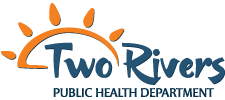Outbreaks
The CDC keeps a tally on any outbreak related to infectious diseases. Click this link to look at the page that is updated regularly by the CDC. Staff members at Two Rivers Public Health Department are ready and willing to answer your questions about outbreaks and infectious diseases. Just give us a call or send an email.
TRPHD works with partners to monitor reportable diseases, detect disease clusters and outbreaks, and help to prevent the spread of disease.
TRPHD is committed to promoting healthy communities, families and individuals through communicable disease surveillance. The intention of surveillance is to identify, promptly investigate, and monitor each incident of a reported communicable disease. Timely recognition of the disease within the community enables the proper implementation of prevention and control activities. This action can contain the spread of the disease before the illness becomes a major public health crisis.
A good surveillance system also identifies emerging infectious diseases, acts of bioterrorism, and potential influenza pandemics, as well as providing a basis for evaluating the outcome of public health prevention programs.
Communicable disease can be identified as by being contracted from the human living environment, including disease passed from person to person, food or water, animals, or insects.
If you have any concerns or feel you need to report please call: 888-669-7154.
See our Reportable Disease Laws page for Nebraska DHHS reportable disease list and information.
Disease Surveillance and Investigation
We work diligently in the early detection, intervention, prevention and education of communicable diseases. Our public health department is notified of communicable disease laboratory results through the National Electronic Disease Surveillance System (NEDSS). The community health nurse investigates each report, which may include patient interviews and physician consultations. Recommendations are made to patients to prevent, promote, and protect the health of community members.
Below is a list of examples of some of the diseases/illness we monitor and investigate in our jurisdiction:
- Enteric/Foodborne illnesses: Salmonella, Shiga toxin producing E. Coli, enteropathogenic E. Coli, Campylobacter, Cryptosporidium, Shigella, etc.
- Vaccine Preventable Diseases: Pertussis, Measles, Rotavirus, Varicella, Hepatitis A, Hepatitis B, etc.
- Vectorborne/Arboviral diseases: Lyme disease, Rocky Mountain Spotted Fever, Dengue, West Nile, Tularemia, Zika, etc.
- Zoonotic Diseases: Rabies, Brucella, Toxoplasmosis, etc.
- Environmental: Lead poisoning, carbon monoxide poisoning, ricin poisoning
- Miscellaneous category: TB, Hepatitis C, Bacterial Meningitis, Legionella, Histoplasmosis, Influenza, etc.
Foodborne Illness Investigation
You can help us identify foodborne outbreaks by telling us about your illness and things you ate in the days before you became ill. Your answers could help us identify foodborne outbreaks and prevent others from becoming ill.
Tuberculosis Investigation and Case Management
Our health department is contracted by the State of Nebraska Tuberculosis (TB) Program to conduct investigations of active TB cases, including investigating case contacts. TRPHD case manages active TB diagnoses. This involves working closely with the patient’s physician to observe the patient through Direct Observation Therapy (DOT), ensuring compliance with the prescribed treatment. You can find more information on TB on the Nebraska Tuberculosis Prevention and Control Program website.
School Surveillance Program
This program tracks and reports the absenteeism of ill students for all counties in the health district throughout the school year. School surveillance is done on a weekly basis and is reported to Nebraska Health and Human Services every Wednesday. Tracking of specific symptoms and illnesses in children enables public health to determine if there is an outbreak or a public health emergency in a timely manner.
Seasonal Influenza Surveillance
Weekly tracking of influenza and influenza like illness in our jurisdiction is done using the following methods:
Hospital Surveillance
Influenza and influenza like illness related hospitalizations are tracked weekly by the nine hospitals in our district. Their admissions are reported to Nebraska Health and Human Services every week and help public health monitor influenza outbreaks.
Sentinel Surveillance
TRPHD recruits a sentinel provider in our health district. This program tracks influenza like illness with a local healthcare provider on a weekly basis. The physician reports all influenza cases seen in their clinic to the Center for Disease Control.
Laboratory Reporting
Laboratories in our district report weekly with Influenza A, Influenza B, and RSV testing preformed and results.
Outbreak reports
Long term care facilities, schools, and other facilities report outbreaks of influenza and influenza like illness to help monitor influenza in our communities.
Tick-Borne Diseases
Here is a link from the Health Advisory Network on tick-borne diseases, and illnesses. Please read: http://dhhs.ne.gov/publichealth/HAN/han%20Documents/ADVISORY062018.pdf

